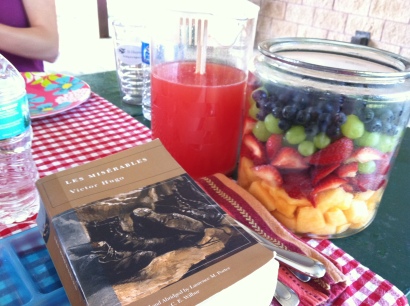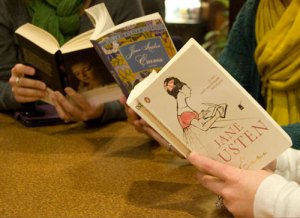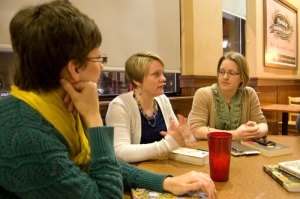Dear Ernest,
Well, Janet finally convinced us to add one of your books to our book club reading list. No, not one of your novels, but your memoirs from living in Paris, A Moveable Feast. I didn’t realize that the book was finished and published after you died. And I thought it was pretty interesting that it was put together from manuscripts that were found long after your time in Paris living, working, drinking, gambling and hanging out with some of the greatest names in literature at that time. Not many people can say they were welcome to randomly stop by Gertrude Stein’s apartment or that they rode around the European countryside in F. Scott Fitzgerald’s car.
As I read about your time in Paris in the early 1920s, I thought about how your time as an ambulance driver in World War I and the injuries you suffered there might have affected your writing, and, well, your life in general. I imagine your experience had a profound impact on you and it seemed to show up in some of the melancholy and wistfulness of your tone. I wonder if I was the only one who observed sadness in your writing or if my other book club friends noticed it too. I guess I will just have to ask them when we meet today. And not to psychoanalyze you (since I have no training whatsoever), but I also theorize that your time in World War I (and reporting on The Spanish Civil War and World War II) shaped and affected you to such a degree that it probably played some role in the depression and alcoholism you suffered throughout your life, your failed marriages and your eventual suicide in 1961.
But I’ll spare you my judgment or any lectures (since I doubt you would care much anyway), and instead I’ll offer compassion for all of the hard times you experienced during your life. I’ll also thank you for leaving such a literary legacy. I can see why many people enjoy your direct, straightforward style that I am sure your journalistic endeavors helped you to hone.
Out of all of your writings, I’m glad our book club chose A Moveable Feast for our first experience with your work, especially since part of your literary legacy includes inflicting quite a bit of pain and suffering on high school students, like my husband, who have been assigned The Old Man and the Sea for their high school English classes. Somehow, I think me telling you that would make you smirk a little bit. I had similar feelings about your friend F. Scott Fitzgerald’s novel, The Great Gatsby, but we can talk about that another time.
Thank you for your contribution to literature that we get to read and discuss this month!
Sincerely yours,
Gwynne
P.S. I hope you are enjoying your current job in human resources. I am sure helping a young startup company is quite rewarding. 🙂
We hope you can join us to discuss A Moveable Feast this evening, Thursday, November 8 at 7 pm at Catherine’s house (let us know if you need directions).
Here are a few questions to think about for our discussion:
- What sort of letter would you write to Ernest Hemingway? A friendly letter, a thank you note, an invitation to dinner, a notice to sue for pain and suffering?
- What do you make of Hemingway’s remark in his Preface,”If the reader prefers, this may be regarded as fiction. But there is always the chance that such a book of fiction may throw some light on what has been written as fact.”? What is he saying? Is he suggesting little of none of his memoir is true? (Don’t worry if you’re not sure: no one is—the line is a bit of a puzzle.)
- Given his later renown and personal excesses (alcoholism, braggadocio and bluster, womanizing, meanness), what do you make of this young Hemingway? How would you describe him? Is he a likable? Admirable?
- What was the relationship between Hemingway and his first wife, Hadley, as described in A Moveable Feast? Where do you see the fault lines of their marriage? What part did horse racing play? Some have surmised that Hadley was the one woman (wife) he truly loved. What happened?
- Talk about Hemingway’s depictions of the famous literary characters in his Paris circle of friends. Whom do you find most interesting? What does he say, for instance, about F. Scott and Zelda Fitzgerald? Some readers have found his observations (even his treatment) cruel; others see Hemingway as honest if acerbic. What do you think?
- Which episodes do you find particularly funny—perhaps the luncheon incident with Ford Madox Ford? Or Ezra Pound? Or the trip to Lyons with Fitzgerald?
- Writing from a distance of some 30 years, Hemingway paints a beauty, even glamour, in being poor and hungry…in Paris…at that moment. Why does this seem to have been such a happy time for him? What lends this work its twilight nostalgia?
- Have you read any of Hemingway’s novels or short stories (which some scholars consider his finest writing)? If so, does reading A Moveable Feast affect how you read his fiction? If you have not other Hemingway works, does this book inspire you to do so?
Thanks to Wikipedia for the biographical information and to litlovers.com for discussion questions 2-8!
Update: Dear Mr. Hemingway,
It has come to my attention that I may have caused considerable offense by addressing you as “Ernest” in my letter above, as several of my fellow book club members (who are more attentive readers than I) reminded me that you detest your given first name. Please accept my most sincere apology for this egregious oversight, and I hope this mistake will not cause you detest me any more than you already would have been predisposed to detest me.
Sincerely,
Gwynne











